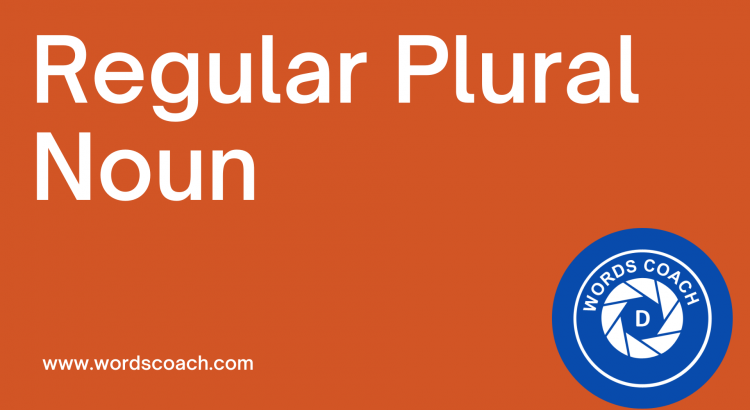What is a regular Plural Noun?
Regular Plural nouns are nouns that represent more than one person, place, thing, or idea. Plural nouns are formed from singular nouns by adding an –s at the end.
| Singular | Plural |
| Boy | Boys |
| Book | Books |
| Dream | Dreams |
| Girl | Girls |
| House | Houses |
Learn how to form regular plural nouns in English with examples.
Regular Plural Noun: Rules and Examples
1. General Rules to Form Plural Nouns
Most singular nouns are made plural by adding -s to the end of the singular form.
Examples:
bag – bags
table – tables
house – houses
dog – dogs
2. Special Rules to Form Plural Nouns
- Nouns Ending in a Sibilant Sound
When a noun ends in a sibilant sound – /s/, /z/, /ʃ/, /ʒ/, /tʃ/ or /dʒ/ – the plural is formed by adding -es, or -s if the singular already ends in -e.
Examples:
1. kiss – kisses – /ˈkɪsɨz/
2. dish – dishes – /ˈdɪʃɨz/
3. witch – witches – /ˈwɪtʃɨz/ - Nouns Ending in ‘f’ or ‘fe’
The plural form of some nouns that end in ‘f’ or ‘fe’ is made by changing the ending to -V(es).
Examples:
1. knife – knives
2. thief – thieves
3. wolf – wolves
4. half – halves
5. leaf – leaves
6. life – lives
7. roof – roofs
8. chef – chefs
Exceptions:
1. chef – chefs
2. belief – beliefs
3. roof – roofs
4. chief – chiefs
5. cuff – cuffs
6. knockoff – knockoffs - Nouns Ending in -o
When a noun ends in “o” preceded by a consonant, the plural in many cases is spelled by adding -es.
Examples:
1. mosquito – mosquitoes
2. potato – potatoes
3. hero – heroes
4. tomato – tomatoes
Exceptions:
1. piano – pianos
2. photo – photos
3. halo – halos
4. soprano – sopranos
Nouns that end in ‘o’ preceded by a vowel are made plural by adding -s.
Examples:
1. radio – radios
2. stereo – stereos
3. video – videos - Nouns Ending in -y
When the ‘y’ follows a consonant, changing ‘y’ to ‘i’ and adding -es.
Examples:
1. lady – ladies
2. puppy – puppies
3. city – cities
4. candy – candies
5. country – countries
6. family – families
When the ‘y’ follows a vowel, the plural is formed by retaining the ‘y’ and adding -s.
Examples:
1. boy – boys
2. key – keys
3. donkey – donkeys
4. holiday – holidays
5. day – days
3. Plural Noun Rules for Irregular Nouns
Irregular plural nouns don’t adhere to specific rules.
Examples:
1. Foot – feet
2. Mouse – mice
3. Child – children
4. Tooth – teeth
Sentence Example:
1. I’ve got new sunglasses. Do you like them?
2. He always wears shorts, even in the winter.
3. I bought a new pair of binoculars last week.
4. My clothes are wet. I’ll have to go upstairs and change.


Very useful
 very good app I love
very good app I love 

 too
too 








